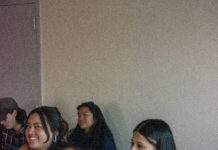Tenure requirements for Colorado Mesa University professors would be reduced from seven to six years under a proposal discussed by the CMU Faculty Senate (FS) Nov. 2.
The policy change was one of a half-dozen proposals considered by FS. Most were tabled for future consideration.
Discussion of the proposed changes to the tenure and promotion (T&P) handbook was broken down into the six proposals presented by the Ad Hoc T&P subcommittee. Brenda Wilhelm, a professor of sociology and chairperson of the subcommittee, provided an introduction to each item.
Proposal one focused on tenure and promotion clocks. Wilhelm told the Senate the proposed revision is mostly about aligning the clocks so that promotion and tenure clocks are the same. Wilhelm said the current seven-year tenure clock seemed too long and six years is fairly standard among other schools.
Karen Urban, representing health sciences, stated that she had received feedback from members of her department on the issue. She said faculty members already tenured or close to submitting tenure suggested the timeline was not realistic. Members of her department felt it took a few years to get on track with teaching at CMU.
“I’m just saying the feedback I got was that changing the policy will make it difficult to reach the requirements,” Urban said.
Center for Teacher Education Representative Lisa Friel-Redifer stated that most people move up in their sixth year anyway. Middleton pointed out that only one other Colorado school, CU Boulder, had a seven-year track.
Grandfather questions were raised by a few different senators and it was discussed that this issue was currently open to interpretation. FS President Joshua Butler suggested clarification on wording to alleviate questions.
In spite of concern over wording, when Butler asked for a motion to approve the item as written.
Proposal two is for early tenure and promotion.
“A lot of people go up early […] and I think we wanted to make it clear what early means,” Wilhelm said. According to Wilhelm, prior years have held confusion and misinformation about negotiating for early tenure.
Wilhelm stated that the issue is about focusing on the longevity of faculty at CMU. The item is designed to stop people from going up for early promotion in two years and early tenure in four years.
“There was a lot of discussion in our committee over this one. A lot of heated discussion,” Colorado Faculty Advisory Council Representative and FS Vice President James Ayers said.
“I think this is a step in a good direction, but I would like to see more done,” Ayers said. “There is flexibility in this proposal. My concern is that the flexibility will be made to people in a fair way.”
Social and Behavioral Sciences Representative Sarah Swedberg said the feedback in her department was that there should be a greater connection to proposal five, three-year tenure and promotion process. Swedberg also said a member of her department said he wished the guidelines were in place when he arrived.
Physical and Environmental Sciences (PES) Representative Jared Workman took issue with the wording of the proposal. Workman noted the term “exceptional” as related to faculty performance and suggested the proposal should state that exceptional performance would be defined by individual departments.
Swedberg suggested that Workman add the clarification about departments individually defining excellence. Instead of addressing amending the wording at that time, Ayers suggested tabling proposal two until proposal four, regarding departmental guidelines for tenure and promotion was addressed. The Senate agreed to table the issue.
Proposal three recommended changes to the mentoring process. Wilhelm said the changes were relatively minor changes that focused on how mentoring didn’t seem to be working the same way in every department.
Wilhelm said the subcommittee wanted some linkage between who is mentoring and who is sitting on the tenure promotion committee. Wilhelm discussed having a regular turnover in the committee, therefore, junior faculty members can get feedback from more people.

Kinesiology Representative Elizabeth Sharp said a member of her department suggested that if the mentoring process became more formal, the feedback should be a part of faculty members’ records.
Middleton was concerned about the proposal calling for a total of six tenured faculty members to serve as mentors and pointed out that not every department has six tenured members. Ayers suggested it might be reasonable for small departments to have the department heads appoint individuals from outside the department to provide feedback.
Workman said members of PES thought feedback should be provided by volunteers rather than department head appointments. This would make sure the individual was actually interested in mentoring.
Discussion of the proposal turned to standardizing feedback and finding the appropriate things to discuss during the mentoring process. Swedberg said she was once evaluated by a mentor on her level of happiness and had to fight it. Wilhelm suggested listing areas of discussion for mentor feedback.
The subject of mentoring led to comments about departments currently sharing annual evaluations of junior faculty to evaluators without their permission.
Cynthia Pemberton, vice president of academic affairs, said this should not be happening. It was suggested that doing so was dangerous and could lead to lawsuits.
Wilhelm agreed to address the wording of proposal three and the senate agreed to table the issue until their next meeting.
Wilhelm opened discussion on proposal four by saying the item was about providing clarity for what is being evaluated per department for tenure and promotion.
Workman said PES was split on the issue with some members of his department curious as to what would establish equitable standards amongst departments. Middleton followed with asking if a vote would take place among faculty in their respective departments to approve the new documents.
Tom Walla, representing biological sciences, argued against the proposal as written because there were too many questions about how standards would be established and the quality of such standards.
When the senate voted on proposal four, Middleton abstained from the vote and Walla opposed. The rest of the senate voted in favor of the proposal, and the motion to accept proposal four carried.
“You guys are going to be sorry,” Walla said after the senate majority approved the proposal.
After proposal four passed, proposal two was taken off the table for further discussion. Swedberg moved to amend proposal two to include “according to departmental guidelines” when discussing the terms “exceptional” and “exceeds expectations.”
With only one vote from Ayers against, the motion carried.
Discussion of proposal five, focusing on the pre-tenure and promotion process, began differently than the others.
Ayers explained that for some departments, it was not an issue, but that he felt having junior faculty portfolios go through the whole process of review would help to improve them. Middleton did not like the fact the proposal required the process.
“I think five is a great resource faculty could use if they wanted to. With it being required, I’m a no vote,” Middleton said.
“It just seems like it’s making a lot more work,” Friel-Redifer said. “Does it have to be the whole committee, or can there be a subcommittee?”
Swedberg stated that members of her department would feel more comfortable with a smaller review within the department than outside of it, in a campus-wide committee.
Ayers mentioned that many of the pre-tenure processes stop at the dean level at other universities rather than on a campus-wide level. At CMU, there is no dean level, so that process is not available to faculty.
Schultz-Ela returned to the concerns originally addressed by Middleton and stated that anytime something would be required, it was necessary to ask what the consequences would be for a failure to comply. Ayers said the consequences at other schools were that faculty were not reappointed, “basically fired.”
Butler noted there were two main issues with the proposal: the issue of portfolio reviews being mandatory and the issue of workload. The proposal was tabled until the next meeting to allow the representatives to discuss it further with their departments.
Proposal six focused on performance ratings. Wilhelm said the committee noticed the previous wording was odd, based on the definitions of words, and decided it needed to be addressed. Wilhelm said that by definition the rating system went from below standard to advanced and really advanced before dropping down to meet expectations and then up again to exceed expectations.
“The expectations should be relatively high,” Friel-Redifer said, and then asked why faculty should then have to exceed already high standards in order to be promoted.
FS agreed to table the proposal until their next meeting.
Associated Student Government (ASG) President Ben Linzey discussed rectifying disorder over who is in charge of fall events and creating distinctions between fall break, parents weekend and homecoming. Linzey told the senate that temporary bike racks would be placed in areas deemed to be of high usage with the possibility of establishing permanent racks.
The ASG president also talked about the recent students who’d been struck in crosswalks and the ideas originating within ASG to solve the problem. The report concluded with Linzey asking for recommendations for the president’s parking pass every month.
The senate also voted on the recommended military credit policy. Trustee Chad Middleton, asked about the policy changes and it was made clear that the policy was a matter of remaining in legal compliance. The policy passed unanimously.





